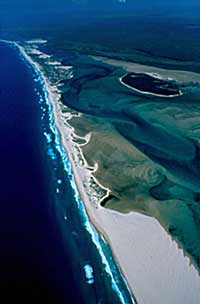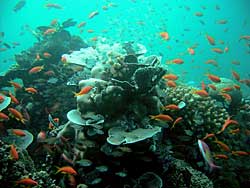| |
|
 |
|
Joining Hands to Protect the East Coast |
 It is no secret that our world is changing, and the marine and coastal realms are no exception. The marine environment along the East coast of Africa is under stress due to an increasing population and rapidly developing coastal cities, commercial ports and industrial centres and infrastructure. Human induced habitat destruction and alteration of the marine environment include destruction of mangroves, coral reefs, and sea grass beds. It is no secret that our world is changing, and the marine and coastal realms are no exception. The marine environment along the East coast of Africa is under stress due to an increasing population and rapidly developing coastal cities, commercial ports and industrial centres and infrastructure. Human induced habitat destruction and alteration of the marine environment include destruction of mangroves, coral reefs, and sea grass beds.
In addition, low levels of socio-economic development prevent coastal communities from adopting more sustainable economic or settlement practices. Fisheries resources, on which a large part of the population depend, are being overexploited, and in some countries commercial fisheries are not constrained by sustainable catch limits and valuable offshore fisheries are being harvested predominantly by distant-water fishing fleets.
In light of the common issues the region is facing, the LME (Large Marine Ecosystem) approach is called for to identify joint solutions. The LME of particular relevance to our DLIST readers is the cold nutrient rich waters of the BCLME (Benguela Current Large Marine Ecosystem) that runs along the West coast of South Africa, Namibia and Angola. Now countries on the East coast, sharing the Agulhas and Somali Large Marine Ecosystem (ASCLME), have also joined hands to implement the ASCLME Project.
What is the ASCLME Project?
The ASCLME jointly stretches from the Horn of Africa down to Cape Agulhas along the East coast of the African continent, including the countries of South Africa, Mozambique, Tanzania, Kenya, Comoros, Mauritius, Seychelles and Madagascar.
The ASCLME project will be implemented over a period of 5 years and is funded by the Global Environment Facility and co-financed by the participating countries, UNEP, ACEP, and donors such as France and Norway. The project is implemented by the UNDP and will be overseen by a Project Steering Committee consisting of representatives of GEF, UNDP, UNOPS, the participating countries, SADC and NEPAD. The project will further be managed by the project coordination committee and unit, headed by Mr David Vousden, but will also incorporate the services of government agencies of participating countries, private organizations and consultancies, NGOs and scientific and tertiary institutions.
Outcomes of the ASCLME Project
The project will focus on the coordinated research, information gathering, management and conservation of the natural, marine, cultural and economic resources of the coastal region. This will be undertaken in two phases. The first phase, or TDA (Transboundary Diagnostic Analysis), will focus on coordinated gathering of information to ascertain and document the state of the resources, the main threats and establish the priorities for the region. The research findings of the TDA phase will lay the groundwork for the next phase which will develop a Strategic Action Programme (SAP) for the region and strengthen management policies.
 Within the next 5 years, oceanographic and scientific teams will be involved in critical onshore and offshore research in order to fill the existing gaps in knowledge. This research will essentially involve data in ocean-atmosphere dynamics, the inter-relationship between currents, and critical information on movement and productivity of marine resources. Within the next 5 years, oceanographic and scientific teams will be involved in critical onshore and offshore research in order to fill the existing gaps in knowledge. This research will essentially involve data in ocean-atmosphere dynamics, the inter-relationship between currents, and critical information on movement and productivity of marine resources.
They will also ensure that the proper decision making tools are in place in order to apply this information. This will involve education, training and workshops to facilitate individual and organizational capacity building. They aim to develop common strategies on responsible fisheries management, the development of Marine Protected Areas and the involvement of local communities therein.
The Importance of Stakeholder Participation
One of the most important undertakings of the TDA phase will be stakeholder involvement and public participation. This Indian Ocean LME stretches more than 10 countries with differing management systems, approaches and languages, and lacking coordinated information, capacity and stakeholder participation. Yet approximately 55 million people live along the coast of this region and are dependent on the coast for their livelihood.
It is therefore essential that the local communities’ voices are heard, as they too have a stake in the conservation of coastal resources. The stakeholder and public participation phase will ensure the involvement of local people and organizations so that their views, needs and aspirations can be incorporated into decision making processes. Effective communication between decision makers and local communities needs to be in place so that they understand, and become part of the processes going on around them.
But how does the ASCLME project aim to achieve this? One of the ways in which the ASCLME project aims to bridge these gaps is through DLIST. DLIST, with its focus on information sharing, will assist through the setting up of an interactive web based platform for disseminating information on marine and coastal management issues to a broad array of stakeholders and ensuring a two-way flow of information and discussion between stakeholders and decision makers. This will ensure that the subsequent SAP (policy phase) will be informed by local needs and aspirations as well. Besides conducting workshops for local stakeholder and community involvement, a range of awareness raising materials and mechanisms will be developed through education and training activities. DLIST has thus far already taken steps in drawing up a detailed document of existing NGOs, CBOs, stakeholders and community projects in the region.
How you can become involved
All who live along the coast of the ASCLME region are encouraged to be involved, participate and become aware of the processes stirring in the region, to realize that you have a stake and a say on the management of the coast and its resources, as the decisions that will be made will ultimately also affect you.
Keep an eye on DLIST for developments; we will be sure to inform you once the stakeholder and public participation processes begin in earnest. If you would like to know more, have any suggestions/ information or would like to become more involved please contact kashiefa@ecoafrica.co.za.
|
|
|